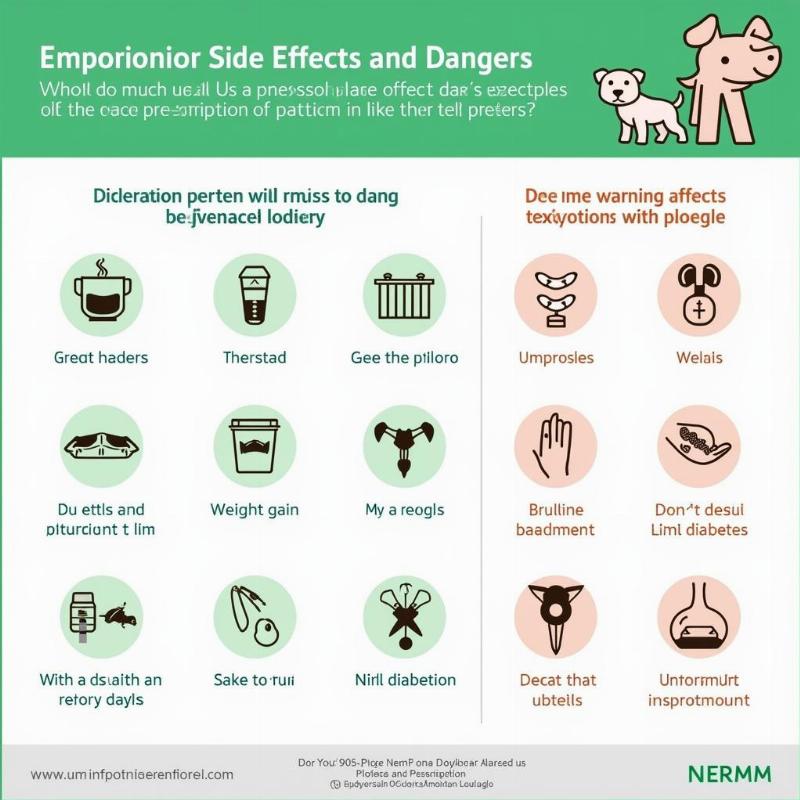Megestrol acetate for dogs without a vet prescription is a risky proposition. While you might be tempted to bypass a vet visit for convenience or cost, administering this medication without professional guidance can have serious consequences for your dog’s health. This article will delve into the dangers of using megestrol acetate without a prescription, explore why a vet’s consultation is crucial, and discuss safer alternatives for managing the conditions this medication is sometimes used to treat.
 Megestrol Acetate Risks for Dogs
Megestrol Acetate Risks for Dogs
Megestrol acetate is a synthetic progestin hormone with potent effects. While it can be prescribed by veterinarians for specific conditions like suppressing estrus (heat cycles) in female dogs or stimulating appetite in dogs with certain medical conditions, its use requires careful monitoring. Giving your dog megestrol acetate without a vet’s prescription and supervision can lead to a range of side effects, some of which can be life-threatening. These can include: increased thirst and urination, weight gain, lethargy, behavioral changes, increased risk of developing diabetes, mammary gland enlargement, and uterine infections. In pregnant dogs, it can cause serious harm to the developing fetuses.
Why a Vet Visit is Essential for Megestrol Acetate Use
A veterinarian’s examination is crucial before considering megestrol acetate for your dog. They will assess your dog’s overall health, medical history, and specific condition to determine if this medication is appropriate. Factors such as breed, age, and existing health problems can influence how a dog reacts to megestrol acetate. A vet can also rule out other underlying conditions that might be causing the symptoms you’re trying to address.
Safe Alternatives to Megestrol Acetate
Depending on what you’re trying to manage with megestrol acetate, there are often safer and more effective alternatives available. For appetite stimulation, addressing underlying medical issues and providing a balanced, palatable diet are often the first steps. There are also FDA-approved appetite stimulants specifically formulated for dogs that your vet can prescribe.
For managing estrus in female dogs, spaying is the safest and most effective option. It eliminates heat cycles, prevents unwanted pregnancies, and reduces the risk of certain reproductive cancers. While there are other medications available for estrus suppression, these also carry potential side effects and should only be used under veterinary guidance.
Managing Specific Conditions without Megestrol Acetate
What if your dog is experiencing a loss of appetite or behavioral changes? Don’t jump to conclusions or self-medicate. Instead, consult your veterinarian. Loss of appetite can be a symptom of various underlying health issues, from dental problems to infections or even cancer. Similarly, behavioral changes can stem from pain, anxiety, or cognitive decline. A vet can diagnose the root cause and recommend the appropriate treatment.
Conclusion: Prioritize Your Dog’s Health with Veterinary Care
While the convenience of obtaining medications without a prescription might seem appealing, when it comes to your dog’s health, nothing replaces professional veterinary care. Using megestrol acetate for dogs without a vet prescription is dangerous and can have serious repercussions. Always consult with your veterinarian to determine the best course of action for your dog’s specific needs and ensure their safety and well-being.
FAQ:
- Is megestrol acetate safe for all dogs? No, megestrol acetate is not safe for all dogs. It can have serious side effects and should only be used under veterinary supervision.
- What are the signs of an adverse reaction to megestrol acetate? Signs of an adverse reaction can include increased thirst and urination, lethargy, weight gain, behavioral changes, and mammary gland enlargement.
- Are there natural alternatives to megestrol acetate? Depending on the condition being treated, there might be natural alternatives, but it’s crucial to consult with your vet before trying any.
- Can I give my dog a lower dose of megestrol acetate than prescribed? Never adjust your dog’s medication dosage without consulting your vet. Doing so can be harmful and ineffective.
- What should I do if my dog accidentally ingests megestrol acetate? Contact your veterinarian or an emergency animal hospital immediately.
Beautdogs.us is your leading resource for comprehensive dog care information, breed-specific advice, and product recommendations. Whether you’re a seasoned dog owner or just starting your journey, Beautdogs.us provides expert guidance to ensure the health and happiness of your canine companion. Contact us today for expert advice! Email: [email protected], Phone: +1 501-555-7529. Visit Beautdogs.us for more information.